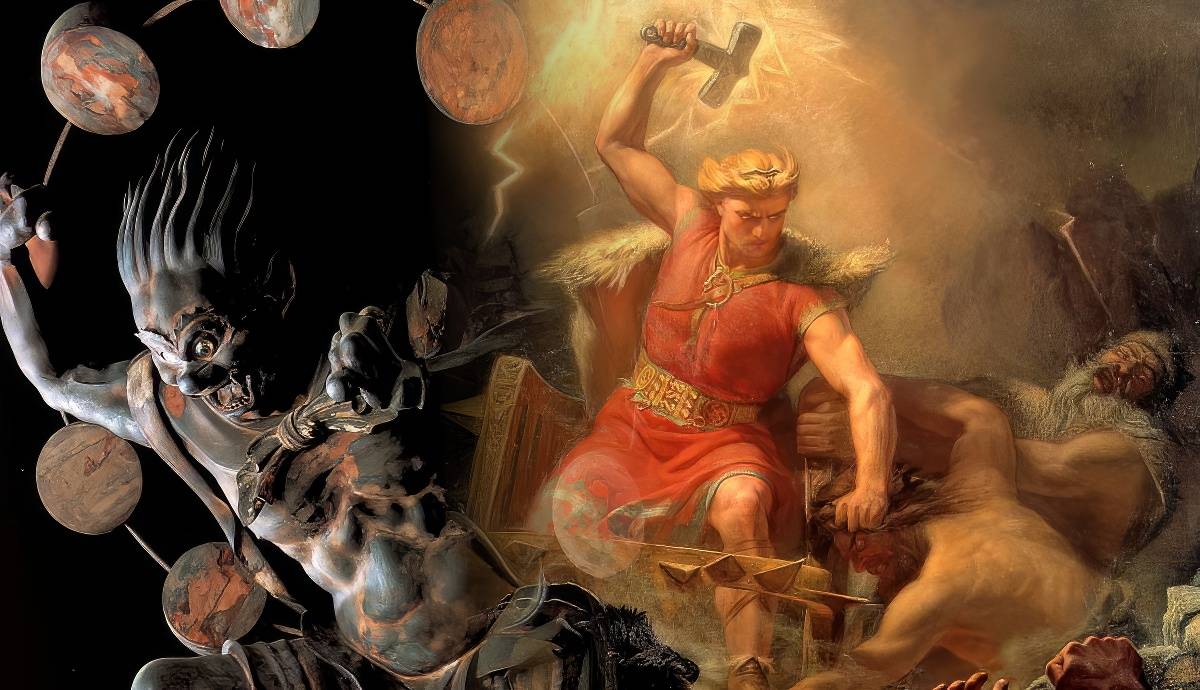This article explores the similarities and differences between Egyptian and Hindu gods, highlighting some of the most important deities from each mythology. It imagines a battle between these powerful beings, with Ra, Isis, Osiris, and Horus representing Egyptian gods, and Brahma, Vishnu, Shiva, and Lakshmi representing Hindu gods. The battle showcases the unique abilities and powers of each deity, ultimately ending in a stalemate. The article concludes with the understanding that the intricate tapestry of the cosmos binds these gods in an eternal struggle between light and darkness, creation and destruction. The gods continue to watch over humanity from their celestial thrones.
The Battle of the Titans: Egyptian Gods vs. Hindu Gods
Introduction
Throughout history, many cultures have worshipped a pantheon of gods and goddesses. Two of the most fascinating and influential mythologies are those of Ancient Egypt and Hinduism. In this article, we will explore the similarities and differences between the Egyptian gods and the Hindu gods, and imagine what a battle between these powerful beings might look like.
Egyptian Gods
The Ancient Egyptians worshipped a vast array of gods and goddesses, each with their own unique powers and domains. Some of the most well-known Egyptian gods include Ra, the sun god; Isis, the goddess of magic and motherhood; Osiris, the god of the afterlife; and Horus, the god of the sky and kingship.
Ra
Ra was considered the most important of the Egyptian gods, as he was believed to be the creator and ruler of the universe. He was often depicted as a falcon-headed man wearing a sun disk on his head, symbolizing his role as the sun god.
Isis
Isis was a powerful goddess associated with magic, motherhood, and healing. She was often depicted with a throne on her head, representing her role as the queen of the gods. Isis was also known for her role in resurrecting her husband, Osiris, after he was murdered by his brother, Set.
Hindu Gods
Hinduism is one of the oldest and most diverse religions in the world, with a pantheon of gods and goddesses that reflect various aspects of the divine. Some of the most important Hindu gods include Brahma, the creator; Vishnu, the preserver; Shiva, the destroyer; and Lakshmi, the goddess of wealth and prosperity.
Brahma
Brahma is the creator god in Hindu mythology, responsible for bringing the universe into existence. He is often depicted with four heads, representing the four Vedas, the sacred texts of Hinduism. Brahma is also associated with the lotus flower, symbolizing purity and creation.
Vishnu
Vishnu is the preserver god in Hinduism, responsible for maintaining order and harmony in the universe. He is often depicted with blue skin and four arms, holding a conch shell, discus, mace, and lotus flower. Vishnu is believed to have incarnated on Earth several times to protect the world from evil forces.
The Battle
Now, let’s imagine a battle between the Egyptian gods and the Hindu gods. In one corner, we have Ra, Isis, Osiris, and Horus, ready to defend their dominion over Egypt. In the other corner, we have Brahma, Vishnu, Shiva, and Lakshmi, prepared to assert their divine power over the universe.
The battle begins with Ra unleashing the full power of the sun, casting a blinding light that engulfs the battlefield. Brahma counters by creating a storm of cosmic energy, sending bolts of lightning crashing down from the heavens. Isis and Lakshmi join forces, weaving powerful spells of protection and healing to shield their allies from harm.
As the battle rages on, Osiris and Vishnu engage in a fierce duel, each using their mastery of life and death to gain the upper hand. Shiva, the fearsome destroyer, enters the fray, unleashing his devastating power to lay waste to the opposing forces. Meanwhile, Horus and Brahma engage in a battle of wills, each using their divine authority to assert dominion over the battlefield.
Conclusion
Ultimately, the battle between the Egyptian gods and the Hindu gods ends in a stalemate, with neither pantheon able to claim victory. Both sets of gods and goddesses return to their respective realms, content in the knowledge that they are bound by the intricate tapestry of the cosmos. And so, the eternal struggle between light and darkness, creation and destruction, continues unabated, with the gods watching over us from their celestial thrones.
